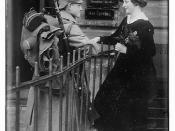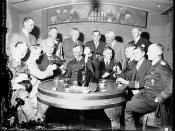Britain's declaration of war upon Germany in 1914 was an act that was to significantly change people's views on war. The First World War was a war of new technology, but old tactics. Generals commanded their men as if any serious damage could only be done at close range (as had previously been the case), failing to notice that the recently developed machine guns could simply sweep across fields and gun down whole companies of men with ease. The war was played out stubbornly in this way for years - commanders refused to change their tactics, resulting in death and little else apart from it.
It was technology coupled with the also newly developed trench warfare that gave WWI its bleak outlook. The trouble was that although trench warfare may have been a new tactic, it was an old idea, and one that would have ceased to work when projectile weapons were introduced, due to the fact that in order to conquer a trench you first have to get to it, most likely getting gunned down in the process.
To further this already fatal situation, the training that soldiers received was so minimal that when they actually reached the front line, some had still never seen a rifle or a grenade. The army was untrained, inexperienced and, for the most part, far too young to go into a full-scale conflict of such proportions, the likes of which had never been known before.
The main reason that trench warfare was developed was because WWI was never planned to be a 'get up and go' war. The armies expected from the outset a slow, grinding conflict where movement was unlikely to play a large part. Unfortunately for the British, the Germans expected this slightly more than the allies, and as a result...


